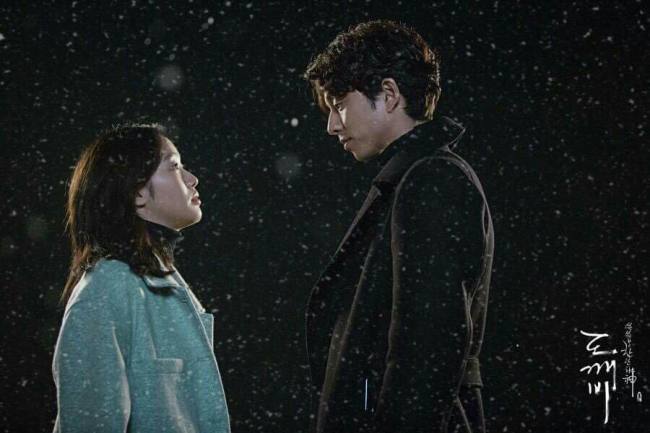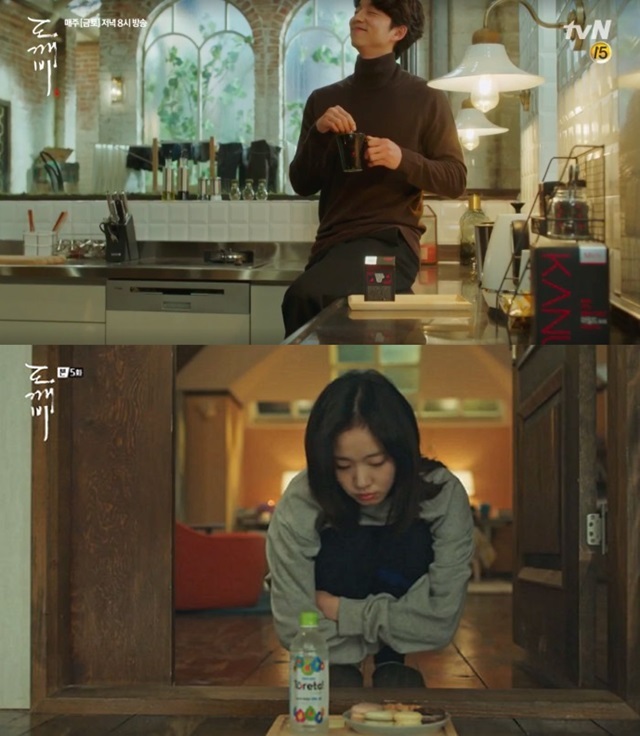‘Guardian,’ popular but controversial
Critics point to gender stereotyping, viewers complain about excessive product placement
By 두루미Published : Jan. 4, 2017 - 17:22
In the popular TV drama series “Guardian: The Lonely and Great God,” the male lead is, quite literally, a god.
Based on the Korean folklore of dokkaebi, a higher spiritual being roughly translated as goblin, the drama series features actor Gong Yoo as Kim Shin, a warrior born centuries ago who, after being impaled with a sword, is transformed into an immortal dokkaebi with endless wealth.
Korean dramas have notoriously favored near-perfect male leads -- attractive, intelligent, heirs to vast fortunes and more. “Guardian” has gone one step further in conjuring an ideal knight-in-shining armor, TV critics say.
“We’ve evolved past god-like men to actual gods, who don the appearance of good-looking human men,” said culture critic Jung Duk-hyun. “Now, their abilities surpass the realm of human strengths.”
Jung says the popularity of the dokkaebi character -- “Guardian” has boasted a record-breaking viewership since its Dec. 2 launch on cable channel tvN, scoring 12.7 percent according to Nielsen Korea -- can be attributed to female viewers’ yearning for all-powerful male figures who can solve the problems of modern women’s increasingly stressful lives.
“The realistic ideal is that two people complement each other in a relationship,” said Choi Ji-sun, 28, a lawyer who has watched every episode of the show, which airs Fridays and Saturdays at 8 p.m.
“But it’s easy to escape to a world where someone will come to my side at the drop of a hat, no questions asked, and provide everything. Of course, I would never expect that of my real life partner.”
In “Guardian,” the female lead Ji Eun-tak, played by Kim Go-eun, is able to summon Dokkaebi Kim simply by blowing out a flame.
Based on the Korean folklore of dokkaebi, a higher spiritual being roughly translated as goblin, the drama series features actor Gong Yoo as Kim Shin, a warrior born centuries ago who, after being impaled with a sword, is transformed into an immortal dokkaebi with endless wealth.
Korean dramas have notoriously favored near-perfect male leads -- attractive, intelligent, heirs to vast fortunes and more. “Guardian” has gone one step further in conjuring an ideal knight-in-shining armor, TV critics say.
“We’ve evolved past god-like men to actual gods, who don the appearance of good-looking human men,” said culture critic Jung Duk-hyun. “Now, their abilities surpass the realm of human strengths.”
Jung says the popularity of the dokkaebi character -- “Guardian” has boasted a record-breaking viewership since its Dec. 2 launch on cable channel tvN, scoring 12.7 percent according to Nielsen Korea -- can be attributed to female viewers’ yearning for all-powerful male figures who can solve the problems of modern women’s increasingly stressful lives.
“The realistic ideal is that two people complement each other in a relationship,” said Choi Ji-sun, 28, a lawyer who has watched every episode of the show, which airs Fridays and Saturdays at 8 p.m.
“But it’s easy to escape to a world where someone will come to my side at the drop of a hat, no questions asked, and provide everything. Of course, I would never expect that of my real life partner.”
In “Guardian,” the female lead Ji Eun-tak, played by Kim Go-eun, is able to summon Dokkaebi Kim simply by blowing out a flame.

Hit drama series in recent years have seen a surge in male leads who possess supernatural powers. In the 2013 show “I Can See Your Voice,” the male protagonist can read people’s minds. The following year, “My Love from the Stars” featured an extraterrestrial with superhuman powers of sight, hearing and speed as its romantic lead. The male love interest in “Another Oh Hae Young,” which aired last May, is able to see into the future.
“With these abilities, the male becomes a savior of sorts to the female,” said culture critic Ha Jae-geun. “Female viewers find comfort in these characters. But their very support of such characters could lead to a decline in women’s social status.”
During the same period, meanwhile, dramas also saw a rise in independent, true-to-life female roles, suggesting that the Cinderella complex no longer has a footing in Korean television. “Another Oh Hae Young” was lauded for portraying a flawed, relatable female protagonist who is honest about her emotions. “I Can See Your Voice” featured a competent, older female prosecutor as its lead. The currently airing “Weightlifting Fairy Kim Bok-joo” spotlights a heroine for whom a slim figure is not a priority.
“Guardian,” however, offers a female lead who is downtrodden and naive, reminiscent of the conventional “damsel in distress” type.
Ji is motherless, living with relatives who scorn her as a burden to their family, and ostracized at school; Dokkaebi Kim comes to provide for her material comfort and shelter. Granted, the character is sprightly and determined to survive despite hardships, seeking out part-time jobs to support herself.
“But it’s a shame she is unable to escape the Cinderella stereotype, especially when her male partner is so almighty,” says drama critic Kim Sun-young.
The fact that Ji is portrayed as a high school student has sparked further controversy. Dokkaebi Kim is said to be 934 years old, though he sports the appearance of a 30-something man.
“The system of fantasy blocks any guilt and allows viewers to accept, without being repulsed, the romance between a minor and an older man,” wrote TV critic Hwang Jin-mi in a column last month. “But the image of a young girl ... hanging onto a rich, 30-something man ... lingers.”
Awkward product placement

Another issue that has plagued “Guardian” is its overt and awkward product placement.
In a segment in its eighth episode, which aired Dec. 24, the two main characters are at Subway, discussing in detail which ingredients to choose and how large the sandwiches are. The dokkaebi and his housemate only eat fried chicken from a certain franchise for days in a row; every piece of clothing and interior decor is exhibited as if in a magazine spread, and the camera captures brand names.
Though it is normal for TV series to use product placements to fund production, viewers say it has become “excessive to the point of distracting” in “Guardian.”
“It’s gotten to a place where the products (the characters) use are moving the plot along,” said Park Su-jeong, 48.
The competition for product placement in hit dramas is higher than ever, advertising executives say, as featured items sell out instantly both in Korea and throughout Asia. Makeup brand Laneige, for example, reaped 1.2 billion won ($995 thousand) in profit from the lipstick used by actress Song Hye-kyo in last year’s smash hit drama “Descendants of the Sun.”
Ads are meticulously timed and spread through multiple channels, said an entertainment industry official who requested anonymity.
“After viewers watch the show, they go online to look up items they liked,” said the source. “So bloggers are paid to upload posts featuring an advertised jacket, for example, right after an episode has finished. The brand then spreads out to offline ads.”
A spot in Gangneung’s Jumunjin Beach has already risen as a bustling tourist zone after “Guardian” shot a scene there. Recent social media photos showed lines of visitors waiting to pose for photos. Merchants have set up shop nearby with signposts that read, “Muffler, flower and umbrella can be rented for 1,000 won,” allowing visitors to recreate the exact scene captured on television.
By Rumy Doo (doo@heraldcorp.com)


















![[Today’s K-pop] Treasure to publish magazine for debut anniversary](http://res.heraldm.com/phpwas/restmb_idxmake.php?idx=642&simg=/content/image/2024/07/26/20240726050551_0.jpg&u=)